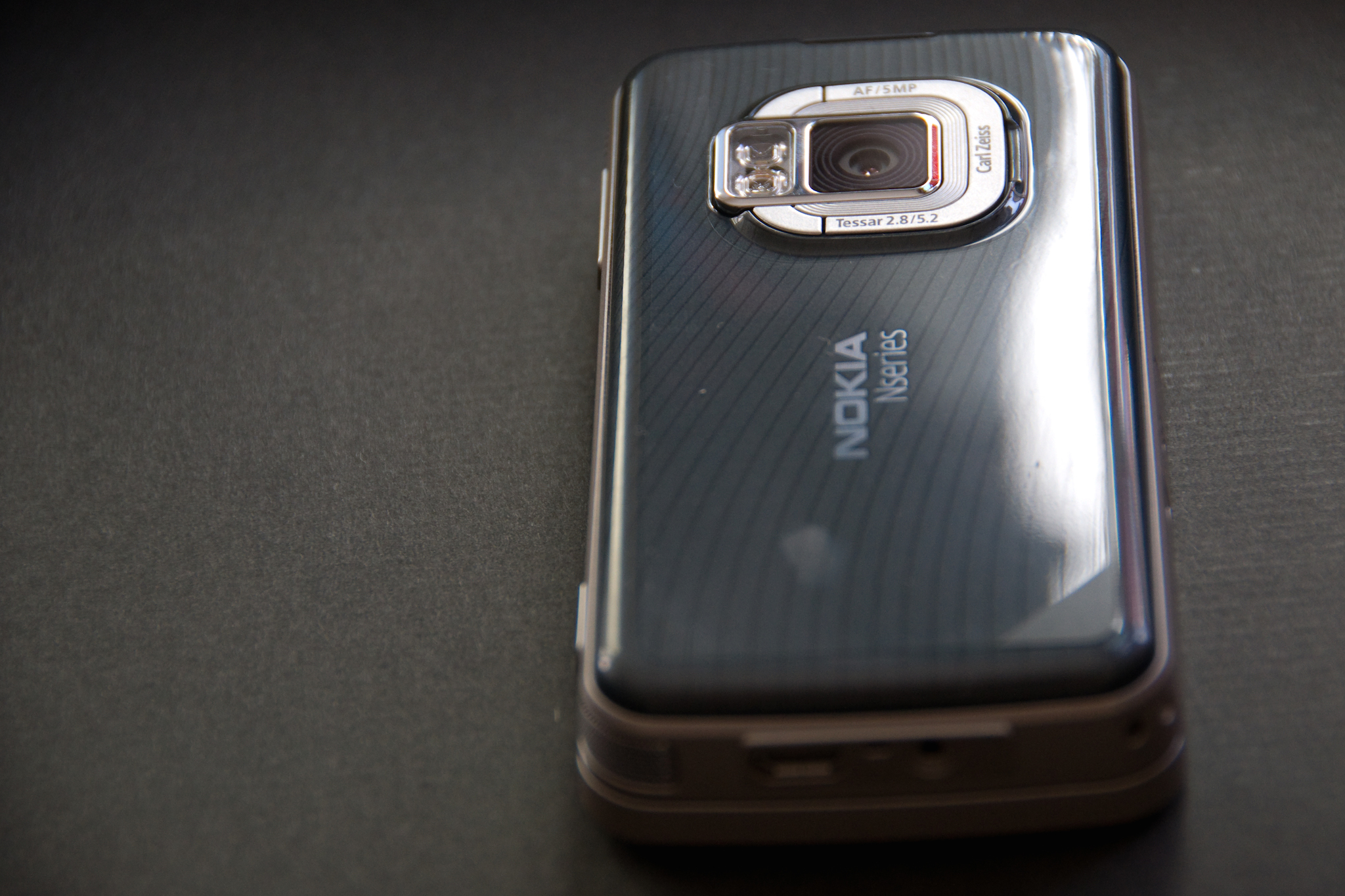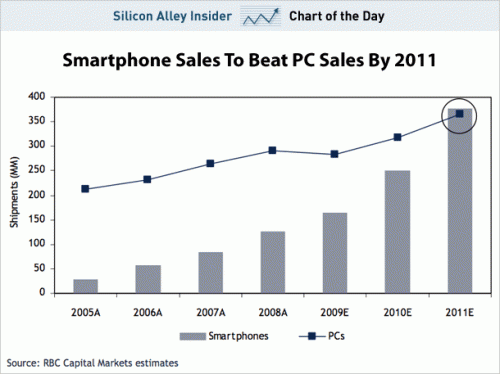Last Friday’s Silicon Alley Insider Chart of the Day should scare Microsoft CEO Steve Ballmer so badly that he accidentally buys a Japanese car. Sorry, Steve, you missed the Cash for Clunkers program. That’s OK, maybe someday the Obama Administration will offer a clunkers program for Windows PCs.
Silicon Alley Insider’s Dan Frommer explains the chart: “By the end of 2011, worldwide smartphone sales will pass worldwide PC sales, RBC analyst Mike Abramsky estimates, approaching 400 million annual shipments of each.” Say, Gartner or IDC, how about you pipe in with some estimates, too, eh?
Consider the numbers this way: Mike predicts that in two years, the computer you carry with you will outsell the one stuck on your desk—perhaps briefcase or backpack. A different perspective: annual cell phone sales run between 1-1.2 billion units, which is more than the entire Windows PC install base. Mike’s forecast means that smartphones could account for somewhere between one-third to perhaps 40 percent of all handset sales in 2011.
For second quarter 2009, Gartner reports that worldwide mobile phone sales to end users declined 6 percent year over year. Meanwhile, smartphone sales grew by 27 percent—damn the economy and smartphones’ higher prices than the so-called dumbphones. Gartner research director Carolina Milanesi explains in an August 12 statement:
Smartphone sales were strong during the second quarter of 2009, with sales of 40.9 million units in line with Gartner’s forecast of 27 per cent year-on-year sales growth for 2009. Given the higher margins, smartphones offer the biggest opportunity for manufacturers. It is the fastest-growing market segment and the most resistant to declining ASPs.
By the way, in the previous two quarters, smartphone sales were 36.4 million and 38.1 million units, according to Gartner. For all 2008: 139.3 million units. Mike Abramsky’s historical data jives with Gartner’s. He forecasts a dramatic jump—more than 125 million units—between 2010 and 2011. OK, I can see that. By 2010, Android phones and iPhone should be available most everywhere—for Apple’s smartphone from multiple US carriers. Meanwhile, Microsoft might have a competitive smartphone operating system in market. BlackBerry surely will continue to succeed.
But netbooks could muck with the numbers, and I wonder if Mike has taken them into account. Much as I loathe the netbook as a subnotebook category, it makes sense as a teleco carrier-subsidized product. Carrier subsidies, performance limitations, 3G wireless and physical size make netbooks closer to smartphones than to laptops. Netbooks and smartphones are on a marketing collision course, with each poised to snatch sales (and marketshare) from the other—or so I predict.
For most of 2009, I’ve asserted that the most sensible sales model for netbooks is carrier subsidy (link removed, sigh). It worked in Europe(link removed, sigh) and is looking to do the same here. By all appearances, Apple’s rumored netbook-competing tablet is more evolved iPhone/iPod touch than lower-cost Mac. The evolved iPhone and not netbook is the strategy I recommended for Apple (link removed, sigh) back in March.
I predict fierce competition between carrier subsidized netbooks and smartphones, with the app/services platform hugely giving a boost to the later. Applications market once moving from PC to Web is now shifting to mobile. I have been saying—and won’t stop—that the mobile device(s) will replace the PC as the dominant computing platform (Hence, the Windows PC clunker poke at the beginning of the post).
A year ago, I asked: “Will your next PC be a smartphone?”(link removed, sigh) Today, I assert that for most people reading this blog, your next PC is a smartphone—or soon will be. Right now, it’s a platform Microsoft has no hope of controlling.
By the way, some apologies. I should have blogged this chart last week, but I’ve been preoccupied getting my daughter into public school (This also explains why I haven’t been blogging). At the end of fifth grade, my daughter asked to be homeschooled. Now, as a tenth grader, she wants back into the public school system. After looking at the nice, new suburban schools, we decided to stick with the local, uglier urban high school.
Uh-oh. In 2003, the Bill and Melinda Gates Foundation made an $11 million donation to three San Diego schools, one of which my daughter will attend. The $11 million follows other donations made two years earlier. I’d like to put a question to you: Is it conflict of interest for me to write about Microsoft if my daughter attends a public school that received money from Bill Gates? Please respond in comments.
Editor’s Note: ZDE/eWeek closed the Microsoft Watch blog, where I was editor until April 2009. I had to remove links to my stories that have vanished from the web.

